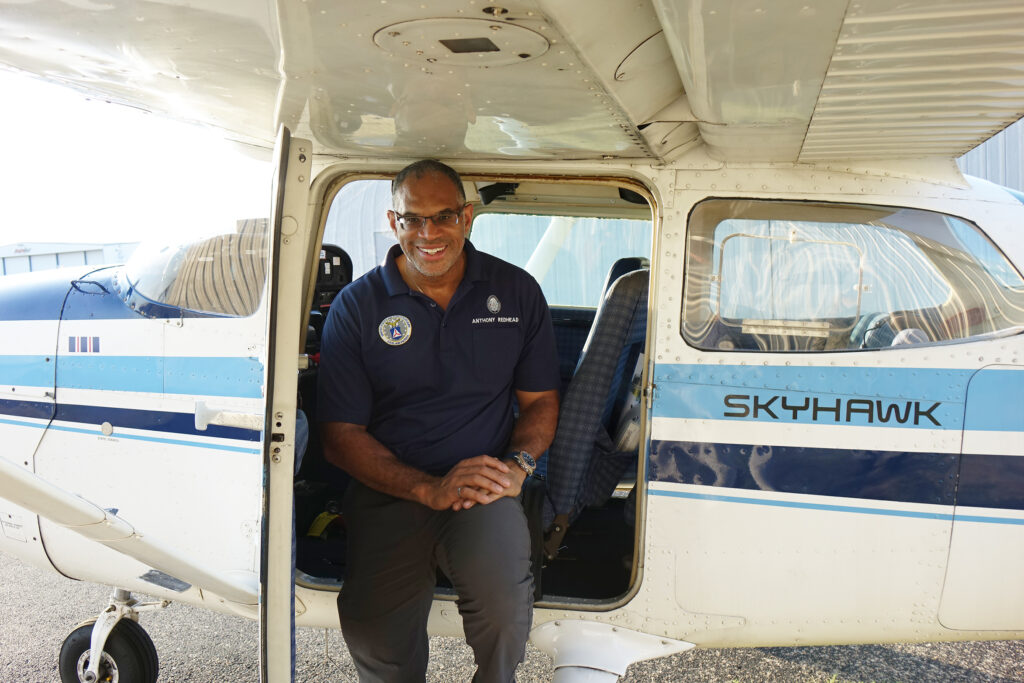One of Georgetown’s best kept secrets is indicative of what’s best about its people. As a non-profit entity, ready to serve at home or wherever called, the Apollo Wing of the Civil Air Patrol is an all-volunteer unit of 70 cadets and 41 senior members whose duty is to provide civilian, auxiliary support for the U.S. Air Force. Their mission is three-fold; provide emergency services, including search and rescue and disaster relief operations; aerospace education; and cadet programs for teenagers.
The cadet program is the key to this story because the CAP is open to any person, age 12 to 18, and is not specific to any school. For students who are in private or home schools, Civil Air Patrol is an opportunity to gain aviation experience, adapt to military discipline, and build the kind of character that serves young people well in college and beyond.
Cadet 2nd Lieutenant Denison and her twin sister joined because they hope to attend the Air Force Academy. “We always liked and wanted to be in the military and I want to be a pilot. This is great exposure and a huge leg up on others who will enlist out of high school. Having been in for a while, even if I change my mind about the Academy, I will still be a part of Apollo Wing. People have poured so much knowledge into me and I’ve learned a great deal.”
Cadet Captain Irey joined when he was 12 years old; “This seemed like the best way to get experience that will help me; I plan to be in Air Force ROTC in college. Already it’s more about the community and growth experiences that will serve me and have been a great benefit in my high school career.”
HOW IT ALL STARTED
In 1938, Milton Knight, an Ohio pilot and businessman, organized, and incorporated the Civilian Air Reserve (CAR) to support the war effort using America’s civilian aviation resources. The organization assumed many missions including anti-submarine patrol and warfare, border patrols, and courier services. During World War II, coastal patrol reportedly flew 24 million miles and sighted 173 enemy U-boats, dropping a total of 82 bombs and depth charges throughout the conflict. Unconfirmed reports say they were responsible for sinking two enemy U-boats. Other military-styled civilian aviation units emerged nationwide after the war, training for homeland defense. The Apollo Composite Wing was stood up in Georgetown in 1978.

Cadets are also exposed to a variety of leadership styles and have the opportunity to be leaders themselves. At an age when peer acceptance is at a premium, it is outside their comfort zones to be “in charge” and often a commander is younger than the cadets he or she is leading. Lt. Denison says, “This is the time to learn how to set goals and work with others to be productive. I’m usually shy and if you told me I would have to speak up or be a commander of any kind, I wouldn’t have believed it. But while acquiring leadership skills, we are learning that safety, rocketry, STEM, aerospace and communications are as challenging as they are rewarding.”
Nationally, Civil Air patrol performs 98% of all inland search & rescue for the Air force 2018: 36 saves and 147 finds
Aside from character and leadership, the education program provides cadets the opportunity to fly with adult members and work toward getting their own pilot license—something that would cost thousands at a commercial school.
IT IS AS MUCH A LEADERSHIP EXPERIENCE FOR THE CADETS AS IT IS FOR THE SENIOR MEMBERS. I WILL HAVE THESE MANAGEMENT SKILLS FOR MY ENTIRE LIFE.
Senior Lt. Tawni Mehan
BE A PART OF IT
The Civil Air Patrol is a non-combat unit, but is counted in our national assessment of force. Apollo Wing meets every Tuesday at 6:30pm at the Georgetown Municipal Airport. Their meetings are open for the public to observe and ask questions about the education programs and community service they provide on a regular basis. Anyone over 21 may apply for the Senior Service and be a part of the organization that provides disaster relief; helps maintain critical communications during hurricanes; locate downed planes or wildfires; construct in-field radio towers, and more. Incidentally, PT night is once per month and promotions are achievement-based.
Apollo has doubled its platoon size in the past year simply by word of mouth, but one only needs to speak to any of their enthusiastic cadets to understand what Senior Lt. Tawni Mehan says about her engagement; “I was just going to put my foot in to see what it was all about, but I was completely sucked in by the values I see and learn from the people here, and I’m happy to be part of the family. Everyone works hard for personal growth; it’s a choice to be here, so achievement is common. I wish more young people could experience this and also exhibit the kind of character I see in these cadets.”

Anthony Redhead pilots the squadron’s Cessna 172 — the most popular training aircraft in the world. Civil Air Patrol cadets fly with him to learn how to take aerial photographs, and also to fly the plane themselves. Cadets as young as 16 years old, after 10-12 hours of training (and if the instructor is confident) are ready to fly solo around the air field. Senior members bend over backwards to help the cadets train and prepare, and Anthony says, “This is the most awesome job. It is very rewarding to see the reaction of the kids in flight and the reaction of the parents when the kids come back. They see how much fun the kids had and have a new sense of confidence.”
